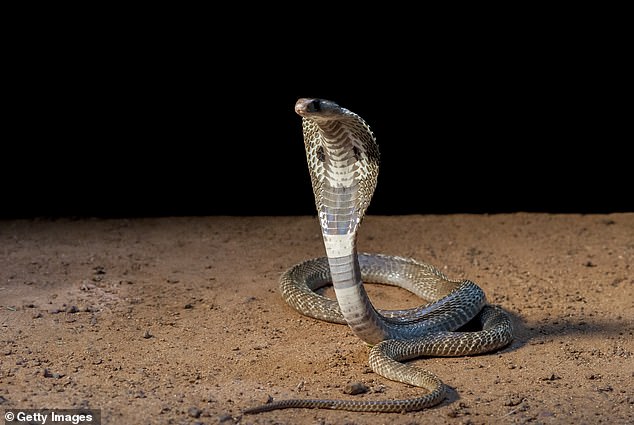Indian man shockingly bites snake to death after reptile attacked him in his sleep
What would be your first reaction if you were bitten by a snake while you were sleeping?
Scream? Jump out of bed? Run?
Santosh Lohar reacted differently and bit the snake to death in retaliation.
The 35-year-old man from Panduka, Kharkhand in India, was asleep when the reptile attacked him. He then used an unusual tactic: he quickly grabbed the reptile with an iron rod and bit it twice.
Santosh Lohar (pictured) said he bit the snake because a local superstition says that if you bite a snake twice, its venom is rendered harmless.
Railway construction work was underway in a forest area when the attack took place near the workers’ base camp.
When asked why he bit the snake back, Lohar said India Today: ‘In my village there is a belief that if a snake bites you, you must bite back twice to neutralize the poison.’
Although a bite from a venomous snake can be fatal, a person who bites a snake has few consequences. The only thing that can happen to him or her is the risk of being attacked again.
This is because snake venom is stored in the reptile’s gland and is only released when it enters the bloodstream. Otherwise, it is just a proteinaceous substance.
Snake venom is used in medicine to treat many conditions, including cancer, high blood pressure, heart attacks, strokes, and Alzheimer’s and Parkinson’s diseases.
It is not known what species of snake attacked Lohar. He was rushed to a nearby hospital where he was given an antidote. He was released the next day.
Bihar, the region where the railway was being built, is one of the three states in India that experiences the highest number of snakebites. According to the National Health Mission.
India is home to nearly 300 species of snakes, of which more than 60 are highly venomous. These include the Indian cobra, the Russell’s viper, the common krait and the saw-scaled viper.
These snakes are often referred to as the ‘Big Four’ because of their potent venom and the number of snakebites they cause each year.
According to a 2020 studyThe Russell’s viper was responsible for 43 percent of all snakebites in India between 2000 and 2019, while krait vipers were responsible for 18 percent of all bites and cobras for 12 percent.
These venomous bites contain neurotoxins that cause symptoms such as blurred vision, difficulty breathing, pain and swelling.

Pictured: Indian cobra, one of the most venomous snakes in India
The venom attacks the circulatory, nervous and muscular systems and can destroy the outer membrane of the capillaries, causing internal bleeding and blood clots.
Capillaries are the smallest and most common blood vessels in the human body, connecting arteries to veins.
‘Venomous snakebites can cause acute medical emergencies including shock, paralysis, hemorrhage, acute kidney injury, and severe local tissue destruction, which can be fatal or lead to permanent disability if left untreated,’ the study said.
If someone is bitten by a snake, doctors advise seeking immediate medical attention and removing any rings and watches before the body begins to swell.
It is also important to safely take a photo of the snake so that doctors can identify the breed and begin treatment.
While waiting for medical help, you should sit in a neutral position to slow the spread of the venom and clean the bite with soap and water.
